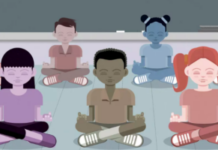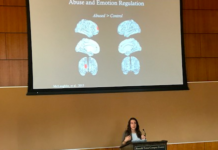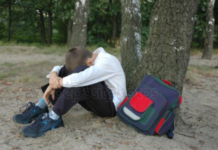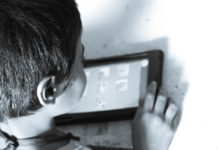Is Mindfulness Meditation Good for Kids?
From Vox: Mindfulness-based interventions are increasingly being introduced in schools and touted as helpful methods of reducing students' anxiety and attention problems. However, the research...
Most People with Common ‘Mental Disorders’ Get Better Without Treatment, Study Finds
A new study suggests that most people diagnosed with depressive, anxiety, and substance abuse disorders recover without treatment within a year of diagnosis. “This...
More Students Than Ever Suffer Mental Ill Health
From The Guardian: The number of children and young adults experiencing mental health problems is rapidly rising. More than ever, young people are growing up in...
Omega-3 Screening for Psychiatric Symptoms?
There is a substantial body of evidence suggesting that not getting enough omega-3 fatty acids in your diet may be connected to a diverse array of psychiatric symptoms. In a new study published this month, psychiatrist Robert McNamara and Erik Messamore provide an overview of the evidence and call for screening of omega-3 deficiency in people experiencing symptoms associated with ADHD, depression, mood disorders, and psychosis.
“ADHD Drugs Could Harm Kids’ Sleep”
Children diagnosed with ADHD who are prescribed stimulant drugs have more sleep problems than those with ADHD that do not take these drugs.
“Why Does Psychiatry So Often Get a Free Pass on Standards of Evidence?”
Rob Wipond takes HealthNewsReview.org to task for its coverage of a Philadelphia Inquirer article about a medical device designed for people experiencing panic. He writes that “hyperbolic psychiatric and psychological claims frequently get free passes from otherwise thoughtful medical critics.”
Xanax: Children As Young As 11 Taking Anxiety Drug
From BBC: The abuse of the anti-anxiety drug Xanax is becoming widespread among children and adolescents as young as 11 years old.
"To gain an idea of the...
“When Pills Are the Problem”
In the context of the Silicon Valley suicides, one mother offers her story about her daughter. “It’s my premise that not only the culture of Silicon Valley, but also, almost more importantly, the nature of the remedies that are being proposed in the name of mental health counseling, are to blame in these deaths.”
Outcomes of Childhood Bullying on Young Adults’ Wellbeing
A qualitative study explores young adults’ childhood bullying experiences.
D-Cycloserine Supplement Does Not Add Much to Exposure Therapy
A closer look at a new study reporting that the supplement D-cycloserine improved anxiety when used with exposure therapy.
Relaxation Techniques for Depression and Anxiety in the Elderly
-Time magazine looks at the effects of a number of relaxation techniques on depression and anxiety in elderly people.
“Silent” Forms of Child Abuse Strongly Tied to Depression
Psychological abuse and childhood neglect are strongly associated with depression in adulthood, according to a meta-analysis of childhood trauma and depression published in this month’s issue of the Journal of Affective Disorders. “The findings clearly highlight the potential impact of the more ‘silent’ types of childhood maltreatment (other than physical and sexual abuse) on the development of depression,” the researchers conclude.
Study Explores Impact of Urban vs. Rural Upbringing on Stress Response
A new study investigates the relationships between early-home environmental factors and later-life physiological response to psychosocial stressors.
Racial Discrimination a Clear Contributor to Youth Mental Health Disparities
Greater perceptions of discrimination during adolescence are linked to more depressive and internalizing symptoms.
Linking Screen Time, Smartphones, and Stress Among Young Adults
New review ties increased screen time to increasing anxiety and depression among young adults throughout the United States.
How Neglect and Abuse Change Children’s Brains
From the Center for Health Journalism: Different types of childhood adversity shape the developing brain in distinct ways and need to be addressed accordingly. While...
Child Poverty Linked to Early Neurological Impairment
A new NIH-funded study suggests that children from low-income environments are more likely to have neurological impairments. The researchers claim that these neurodevelopmental issues are “distinct from the risk of cognitive and emotional delays known to accompany early-life poverty.”
Does Your Child Have ‘ADHD’? It Might Depend On Your Doctor
A study published in the journal Pediatrics reveals large differences from one pediatrician to the next when it comes to diagnosing and prescribing drugs for ‘ADHD.’ The researchers found that the percentage of children being diagnosed with ‘ADHD’ varied from as high as 16% of patients at some offices to as little as 1% of patients at others. The data also revealed significant but lower variability in the pediatric diagnosis of anxiety and depression.
“Antipsychotic Use in Youth Without Psychosis: A Double-edged Sword”
This month’s issue of JAMA Psychiatry ran an editorial commenting on recent research revealing that the majority of youth prescribed antipsychotics have not been diagnosed with a mental disorder.
“I’m Not Going, You Can’t Make Me!”: A Community Approach to School Refusal
Consider an imaginary child called Jack who has been avoiding school as much as possible for a month. Standard practice would be cognitive-behavioral therapy or psychoactive drugs to help Jack deal with his anxiety. But what if Jack's social network instead mobilized to help him regain the role of student?
The Connection Between Sleep, Exercise, Screen Time and Cognition in Childhood
Can current guidelines for sleep, exercise, and screen time in childhood be linked to positive cognitive outcomes?
Air Pollution Linked to Mental Health Problems in Children
A new study, published in BMJ Open-Access this week, found a significant link between the level of air pollution in a community and the mental health of the children living there. After controlling for socio-economic status and other potential variables, researchers in Sweden discovered a strong association between the concentration of air pollution in a neighborhood and the amount of ‘antipsychotic’ and psychiatric drugs prescribed to children. The link remained strong even at pollution levels well below half of what is considered acceptable by the World Health Organization (WHO).
“Generation Meds: the US Children Who Grow Up on Prescription Drugs”
“In America, medication is becoming almost as much a staple of childhood as Disney and McDonald’s,” writes Sarah Boseley in the Guardian. In this piece photographer Baptiste Lignel follows six boys and girls to examine the long-term effects of these drugs.
Poor and Foster Care Children More Likely to be Diagnosed and Treated with Psychiatric...
Study details Medicaid-insured birth cohort’s exposure to psychiatric medications and mental health services.
Are Psychiatric Experiments on Primates Ethical — Or Even Truly Useful?
Pediatric psychiatrist Sujartha Ramakrishna describes a planned University of Wisconsin psychiatric experiment "to discover new therapies by dissecting and analyzing the brains of baby...





















